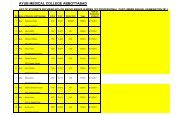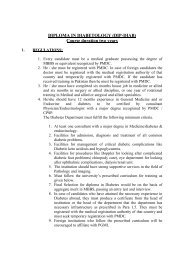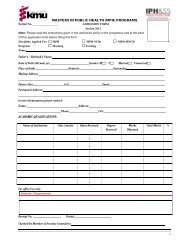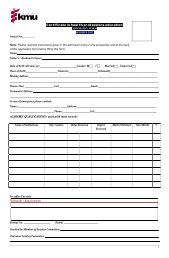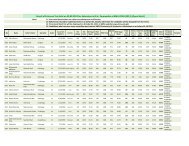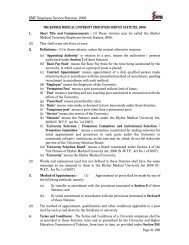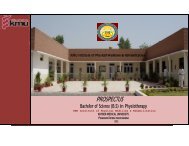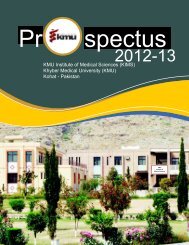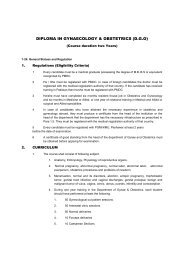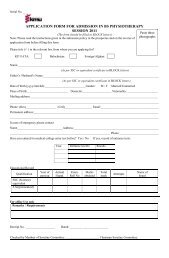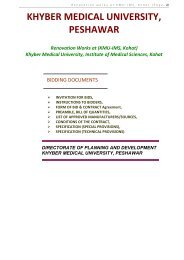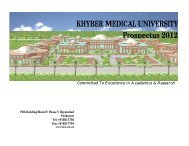At Post Graduate College of Nursing Hayatatbad, Peshawar, Khyber ...
At Post Graduate College of Nursing Hayatatbad, Peshawar, Khyber ...
At Post Graduate College of Nursing Hayatatbad, Peshawar, Khyber ...
Create successful ePaper yourself
Turn your PDF publications into a flip-book with our unique Google optimized e-Paper software.
B. Sc <strong>Nursing</strong> Degree Programmes<br />
(Session 2012-13)<br />
<strong>At</strong><br />
<strong>Post</strong> <strong>Graduate</strong> <strong>College</strong> <strong>of</strong> <strong>Nursing</strong><br />
<strong>Hayatatbad</strong>, <strong>Peshawar</strong>, <strong>Khyber</strong> Pakhtunkhwa
CONTENTS<br />
S # DISCRIPTION PAGE #<br />
1. Introduction ......................................................................... 03<br />
2. KMU Vision .......................................................................... 04<br />
3. KMU Mission ........................................................................ 04<br />
4. Objectives ............................................................................. 04<br />
5. Management and Core Faculty............................................. 05<br />
6. Visiting Faculty ..................................................................... 06<br />
7. Teaching Learning Resources ............................................... 06<br />
8. Teaching Learning Strategies ............................................... 06<br />
9. Clinical Affiliation ................................................................. 07<br />
10. Allocation <strong>of</strong> Seats ............................................................... 07<br />
11. <strong>Post</strong> RN (2 Years Program) ................................................... 07<br />
12. Admission / Selection Policy ................................................ 07<br />
13. Selection Criteria ................................................................. 08<br />
14. Examination Test ................................................................. 08<br />
15. Admission Committee ......................................................... 08<br />
16. Appellate Committee ........................................................... 09<br />
17. Examinations Rules .............................................................. 09<br />
18. Fee and Dues for all Bachelor Programs .............................. 09<br />
19. Fee Refund Policy ................................................................. 10<br />
20. Program Structure ................................................................ 10<br />
21. Frame Work <strong>of</strong> Curriculum for B. Sc <strong>Post</strong> RN (2 Years) ......... 10<br />
22. Year 0ne 1 st Semester ........................................................... 10<br />
23. Year 0ne 2 nd Semester ......................................................... 10<br />
24. Year Two 3 rd Semester .......................................................... 11<br />
25. Year Two 4 th Semester A (Senior Elective <strong>Nursing</strong> Education). 11<br />
26. Year Two 4 th Semester B (Senior Elective <strong>Nursing</strong> Management) 11<br />
27. Year Two 4 th Semester C (Senior Elective Community Health <strong>Nursing</strong>) 11<br />
28. Frame Work <strong>of</strong> Curriculum for <strong>Nursing</strong> Program (4 Years) .............. 12<br />
29. Year 0ne 1 st Semester ........................................................... 12<br />
30. Year 0ne 2 nd Semester ......................................................... 12<br />
31. Year Two 3 rd Semester .......................................................... 12<br />
32. Year Two 4 th Semester .......................................................... 12<br />
33. Year Three 5 th Semester .......................................................... 13<br />
34. Year Three 6 th Semester .......................................................... 13<br />
35. Year Four 7 th Semester .......................................................... 13<br />
36. Year Four 8 th Semester .......................................................... 13<br />
Page 1 <strong>of</strong> 17
37. Baccalaureate <strong>of</strong> Science in <strong>Nursing</strong> Education ..................... 14<br />
38. Curriculum Overview ... .......................................................... 14-15<br />
39. Library Rules ............................................................................ 16<br />
40. <strong>At</strong>tendance ............................................................................... 16<br />
41. Dress Codes .............................................................................. 17<br />
Page 2 <strong>of</strong> 17
INTRODUCTION<br />
The <strong>Post</strong> <strong>Graduate</strong> <strong>College</strong> <strong>of</strong> <strong>Nursing</strong> (PGCN) was established in 1988 with the vision to <strong>of</strong>fer<br />
<strong>Post</strong> <strong>Graduate</strong> Educational Programs in various disciplines <strong>of</strong> nursing to bring the nursing<br />
pr<strong>of</strong>ession at par with international standards so that nurses <strong>of</strong> this college can move and work<br />
comfortably in any diverse culture nationally and across the boarder.<br />
Federal Ministry <strong>of</strong> Women Development and Youth Affairs very generously provided financial<br />
assistance (Rs 3.062 million) to have such a prestigious institute in KP along with building and<br />
other infrastructure for the growth <strong>of</strong> nursing pr<strong>of</strong>ession and for the improvement <strong>of</strong> health<br />
care delivery system. In July 1991 the <strong>College</strong> was taken over by the Provincial Government.<br />
Its foundation was laid in March 1988 with the inception <strong>of</strong> <strong>Post</strong>-registered Nurses Diploma<br />
Course in the field <strong>of</strong> Ward Administration and Diploma in Teaching in subsequent year with<br />
the enrolment <strong>of</strong> ten students in each discipline. Further development rest upon affiliation <strong>of</strong><br />
this college with the University <strong>of</strong> Sheffield UK for award <strong>of</strong> thirteen specialties clinical courses<br />
in different clinical courses. From 1990, under this partnership program thirteen teachers were<br />
trained and on their return they started various courses at PGCN. It was the driving force <strong>of</strong> the<br />
Mrs. FaizAlam Zeb whose untiring efforts brought the dream into reality, the PGNC, a symbol <strong>of</strong><br />
nurse’s identity and was appointed as the first principal <strong>of</strong> the college.<br />
Initially, PGCN started functioning at building <strong>of</strong> School <strong>of</strong> <strong>Nursing</strong> attached with <strong>Khyber</strong><br />
Teaching Hospital, <strong>Peshawar</strong>. On 13 th August 1999 it was shifted to its own newly constructed<br />
building at Hayatabad, having thirteen independent suits with all modern teaching learning<br />
resources. The college is financially and administratively maintained by the Health Department<br />
<strong>of</strong> KPK.<br />
Looking forward toward its vision, the college is proud to initiate first ever B.Sc. <strong>Nursing</strong> Degree<br />
programs. One is a Two Year <strong>Post</strong> R.N for in service nurses, and the second is Four Year B.Sc. as<br />
new induction, affiliation with <strong>of</strong> <strong>Khyber</strong> Medical University <strong>Peshawar</strong>. This will lead to higher<br />
education parallel to any other education in respect <strong>of</strong> knowledge, skills and above all<br />
pr<strong>of</strong>essional dignity, respect and career development.<br />
Page 3 <strong>of</strong> 17
VISION<br />
<strong>College</strong> <strong>of</strong> <strong>Nursing</strong>, provide outcome-based healthcare education that is highly appreciated by<br />
different communities <strong>of</strong> students, educators, and employers for its principles <strong>of</strong> life-long<br />
learning, pr<strong>of</strong>essionalism, academic and clinical excellence, and social responsibility.<br />
MISSION<br />
To prepare competent, compassionate healthcare pr<strong>of</strong>essionals distinguished by liberal arts<br />
education, evidence-based practice, clinical reasoning, safe patient care, and commitment to<br />
social justice.<br />
Optimize health and improve suffering through the diagnosis and treatment <strong>of</strong> human<br />
responses in the care <strong>of</strong> individuals, families, communities, and populations.<br />
OBJECTIVES<br />
The graduate <strong>of</strong> this nursing program will be prepared to:<br />
1. Synthesize knowledge <strong>of</strong> the human experience and responses to health, disease, and<br />
illness in the practice <strong>of</strong> pr<strong>of</strong>essional nursing.<br />
2. Cultivate attitudes and skills necessary to think critically, use clinical reasoning, manage<br />
information, and assume accountability for independent decisions.<br />
3. Provide competent, culturally sensitive care to protect, promote, and optimize health<br />
and alleviate suffering through the diagnosis and treatment <strong>of</strong> human responses in the<br />
care <strong>of</strong> individuals, families, communities, and population.<br />
4. Collaborate effectively in the conduct <strong>of</strong> nursing practice.<br />
5. Use management and leadership skills across the continuum <strong>of</strong> care to create a culture<br />
<strong>of</strong> safe, accessible, cost-effective, quality healthcare.<br />
6. Engage in ethical reasoning and actions to promote advocacy, collaboration, and social<br />
justice as a responsible citizen.<br />
7. Develop an identity <strong>of</strong> self and nurse as inextricably bound and evolving within a<br />
complex, diverse world.<br />
Page 4 <strong>of</strong> 17
MANAGEMENT AND FACULTY<br />
MANAGEMENT TEAM<br />
Management team comprising the following will be responsible to organize and manage entire<br />
teaching learning activities at college level and will coordinate with KMU Authorities:<br />
Core Faculty<br />
Mrs. Shamshad Qadar<br />
Principal PGCN/ Director Degree Programs<br />
1. Ms.Nasreen Ghani , Assistant Pr<strong>of</strong>essor<br />
RN, RM, LHV, (PHSN Pesh) M.A. Islamiat (Pesh University) Diploma in ICU<br />
<strong>Post</strong> RN BSc.N, MSc. N, (AKU), Dip; in Strengthening Midwifery Competence in sexual<br />
and Reproductive Health.<br />
(Korolinska Institute Sweden)<br />
2. Mr. Mohmmad Iqbal , Lecturer<br />
B.Sc <strong>Nursing</strong> (AKU)<br />
3. Mr. Bakhtiar Ali Shah, Lecturer<br />
B.Sc <strong>Nursing</strong> (AKU), MPH (BMU)<br />
4. Mr. Muhammad Zubair Khan, Lecturer<br />
BSc N, RN (Liaqat National Hospital SON, Karachi) <strong>Post</strong> RN BSc (LUMHS Jamshoro)<br />
5. Ms. Shaheen Ghani, Lecturer<br />
RN, RM, LHV, (PHSN Pesh), Diploma in ICU,<br />
<strong>Post</strong> RN BSc.N, (AKU) MPH (PHSA)<br />
Page 5 <strong>of</strong> 17
VISITING FACULTY<br />
(A) NURSING VISITING FACULTY<br />
1. Ms. Nazneen Shad<br />
RN, RM, DWA, DTA, BSc N, MSc Education Management (UK)<br />
2. Dr. Abdul Ghafoor<br />
3. Mr. Arif Mehmood<br />
4. Dr. Niaz Ali<br />
5. Dr. Roshan Ali<br />
6. Mr. Alamgir Afridi<br />
B) MEDICAL AND ALLIED VISITING FACULTY<br />
KMU will arrange visiting faculty according to the curriculum needs.<br />
TEACHING LEARNING RESOURCES<br />
� Lecture Theatres<br />
� Auditorium<br />
� Library<br />
� <strong>Nursing</strong> Skills Laboratory<br />
� Science Laboratory<br />
� Learning Resource Centre (LRC)<br />
TECHING LEARNING STRATIGIES<br />
� Lecture<br />
� Demonstration<br />
� Seminar<br />
� Workshops<br />
� Tutorials<br />
� Reflective journal/Log Books<br />
� Assignments<br />
� Clinical<br />
Page 6 <strong>of</strong> 17
CLINICAL AFFILIATION<br />
� Pakistan Medical Research Centre, <strong>Khyber</strong><br />
Medical <strong>College</strong> <strong>Peshawar</strong><br />
� <strong>Khyber</strong> Teaching Hospital <strong>Peshawar</strong><br />
� Hayatabad Medical Complex <strong>Peshawar</strong><br />
� Lady Reading Hospital <strong>Peshawar</strong><br />
� Ayub Teaching Hospital Abbottabad<br />
� Community Health Centre Nakhi <strong>Peshawar</strong><br />
ALLOCATION OF SEATS<br />
BSc. <strong>Nursing</strong> (4 Years Program)<br />
a) Open merit 25 seats (05 male 20 Female) for KP/FATA/PATA<br />
b) Baluchistan 02 seats<br />
c) FATA 01 seat (Special reserved seat)<br />
d) Afghan Nationals 02 seats<br />
<strong>Post</strong> RN (2 years Program)<br />
a) Open merit 29 (7 seats for male and 22 seats for female applicants) for<br />
KP/FATA/PATA<br />
b) FATA: 1 seat<br />
Open merit seats are open for admission to applicants possessing valid domicile certificate for<br />
KP, FATA & PATA in both the programs.<br />
ADMISSION / SELECTION POLICY<br />
A candidate seeking admission in any <strong>of</strong> the program shall apply on a prescribed form<br />
appended to the prospectus (Blue for B. Sc <strong>Nursing</strong> and yellow for B.Sc. <strong>Post</strong> RN). The candidate<br />
shall submit the application form along with attested photocopies <strong>of</strong> all the documents as<br />
mentioned in the application form.<br />
If any document / information provided by the candidate is found false / fake or fabricated at<br />
any stage <strong>of</strong> course the admission will be cancelled. Incomplete application forms will be<br />
rejected<br />
Page 7 <strong>of</strong> 17
SELECTION CRITERIA<br />
POST RN (2 years Program)<br />
1. Candidate applying for the admission shall fulfill the following criteria:<br />
2. Diploma in General <strong>Nursing</strong> (at least 2 nd division)<br />
3. Diploma in Midwiferyfor female nurses (at least 2 nd division)<br />
4. For male nurses one year diploma in any specialty registered with PNC, at least 2 nd<br />
division ( in lieu <strong>of</strong> Midwifery)<br />
5. Age limit upto 45 year<br />
6. Complete and documentary evidence <strong>of</strong> 02 years experience as an RN in any nationally<br />
recognized institute.<br />
Merit will be calculated as below:-<br />
1. Cumulative percentage <strong>of</strong> all the diploma examinations including midwifery.<br />
2. Percentage marks in entry test.<br />
3. One mark per year <strong>of</strong> the pr<strong>of</strong>essional experience in a recognized institution upto a maximum <strong>of</strong><br />
05 marks.<br />
B. Sc. <strong>Nursing</strong> (4 years Program)<br />
Admission will be open to candidates who have passed the Higher Secondary Certificate<br />
Examination (F .Sc. Pre-medical) or possessing an equivalent qualification from a recognized<br />
board with minimum <strong>of</strong> 50% marks. The merit for admission will be determined as follows.<br />
Examination Test Weightage<br />
Adjusted marks obtained in F.Sc. or Equivalent examination 50%<br />
Entry Test marks 40%<br />
Marks Obtain in S.S.C examination 10%<br />
Note: 10 marks will be deducted from F.Sc. marks for each additional attempt.<br />
Age limit: Upto 30 years<br />
ADMISSION COMMITTEE<br />
The Admission Committee will consists <strong>of</strong> the following<br />
1. Director Academics, Admissions & QA Chairperson<br />
2. Principal PGCN /Program Director Member<br />
3. Coordinator, KMU at PGCN Secretary/ Member<br />
4. Representative <strong>of</strong> Health Department, Member<br />
5. Deputy Registrar (Statutory Affairs & Academics) Member<br />
Page 8 <strong>of</strong> 17
The Chairperson Admission Committee will display the merit list <strong>of</strong> each category <strong>of</strong> candidates.<br />
Objection, if any, be submitted to the Chairperson in writing who will be competent to rectify<br />
any error or omission five days before the date <strong>of</strong> interview. The final merit list will be displayed<br />
two days before the date <strong>of</strong> interview.<br />
The right <strong>of</strong> appeals against the decision <strong>of</strong> Admission Committee will vest in the Appellate<br />
Committee, consist <strong>of</strong> the following.<br />
1. Vice Chancellor KMU Chairman<br />
2. Registrar KMU Member-cum-Secretary<br />
3. Representative <strong>of</strong> Secretary Health Member<br />
4.<br />
All fee and dues <strong>of</strong> the first semester must be paid within 15 days <strong>of</strong> grant <strong>of</strong> admission,<br />
otherwise his/her admission will be cancelled and seat will be <strong>of</strong>fered to the next candidate on<br />
merit list. For subsequent semesters fee and dues if not paid within 15 days <strong>of</strong> start <strong>of</strong> semester<br />
a fine <strong>of</strong> Rs. 100 per day will be imposed. If the student fails to his/her fee and dues within 30<br />
days, his/her name will be struck <strong>of</strong>f from the institution.<br />
EXAMINATION RULES<br />
Examination Rules and Regulations <strong>of</strong> KMU shall apply.<br />
FEE AND DUES FOR ALL BACHELOR PROGRAMES<br />
S/No. Item Amount<br />
1. Admission Fee Rs. 1,000 Per semester<br />
2. Tuition Fee Rs.23,000 per Semester<br />
3. Examination Fee (Mid term)<br />
(Final term)<br />
Rs. 500 Per Semester.<br />
Rs. 1,500 per Semester<br />
4. Clinical Fund Rs. 1,000 per semester<br />
5. <strong>College</strong> Development Fund Rs. 600 per semester<br />
6. Library Fund Rs. 500 per semester<br />
7. Science Lab. Fee Rs. 1,000 per semester<br />
8. Study tour Fund Rs. 1,200 per semester<br />
9. <strong>Nursing</strong> skill Lab Fund Rs. 1,000 Per semester<br />
10. Enrolment Fee (PNC) Rs. 500 Once per program<br />
11. Security Fund (Refundable) Rs. 1,500 Once per program<br />
12. KMU Registration Fee Rs. 1,000 Once per program<br />
13. Graduation Fee Rs 1,000 Once per program<br />
Page 9 <strong>of</strong> 17
FEE REFUND POLICY OF KMU<br />
In case <strong>of</strong> cancellation <strong>of</strong> admission <strong>of</strong> 1 st semester in Bachelor / Master Level Program, the<br />
refund will be made as per policy after deduction given below:<br />
a. Student who leaves the Bachelor / Master level program within the stipulated period <strong>of</strong><br />
admission 5% <strong>of</strong> whole dues <strong>of</strong> 1 st semester.<br />
b. Student who leaves the Bachelor / Master level program within the 7 days <strong>of</strong> admission<br />
10% <strong>of</strong> whole due <strong>of</strong> 1 st semester.<br />
c. Student who leaves the Bachelor / Master level program from 8 to 14 days <strong>of</strong> starting <strong>of</strong><br />
classes 15% <strong>of</strong> whole dues <strong>of</strong> 1 st semester.<br />
d. Student who leaves the Bachelor / Master level program from 15 to 21 days <strong>of</strong> 20% <strong>of</strong><br />
whole dues <strong>of</strong> 1 st semester.<br />
e. Student who leaves the bachelor / Master level program after 21 days <strong>of</strong> starting the<br />
classes dues will not be refunded under any circumstances except security.<br />
Year 1, Semester – I<br />
PROGRAM STRUCTURE<br />
Framework <strong>of</strong> Curriculum for B.Sc. <strong>Post</strong> RN (two years)<br />
S. # Course Title Marks Credits<br />
1 Advance nursing concepts-I theory & Practical 200 6<br />
2 Health assessment theory & Practical 100 3<br />
3 Integrated sciences – I Physiology and Microbiology 100 3<br />
4 Computer in <strong>Nursing</strong> 50 1<br />
5 Pr<strong>of</strong>essional development 100 3<br />
6 Social sciences: Sociology (culture, health and society) and Psychology 100 3<br />
7 English 100 2<br />
Total 750 21<br />
Year 1, Semester – II<br />
S. # Course Title Marks Credits<br />
1 Advance nursing concepts-II theory, practical 200 6<br />
2 Integrated sciences – II Physics and Chemistry 100 3<br />
3 Community Health <strong>Nursing</strong> 100 5<br />
4 Epidemiology 100 2<br />
5 Introduction to management 100 2<br />
6 Fundamental <strong>of</strong> counseling & guidance 100 2<br />
7 English –II 100 2<br />
Total 800 22<br />
Page 10 <strong>of</strong> 17
Year 2, Semester – III<br />
S. # Course Title Marks Credits<br />
1 Advance nursing concepts-III theory & Practical 200 6<br />
2 <strong>Nursing</strong> research 100 3<br />
3 Bio-statistic 100 3<br />
4 Psychology <strong>of</strong> learning 100 3<br />
5 Principles and methods <strong>of</strong> teaching 100 2<br />
6 Clinical teaching and clinical supervision 100 3<br />
7 English –III 100 2<br />
Total 800 22<br />
Year 2, Semester – IV (A) SENIOR ELECTIVE NURSING EDUCATION<br />
S. # Course Title Marks Credits<br />
1 Curriculum planning & Development 100 2<br />
2 Administration in <strong>Nursing</strong> educational program 100 2<br />
3 Principles and method <strong>of</strong> evaluation 100 2<br />
4 English – IV 100 2<br />
5 Practicum (in nursing education) 200 12<br />
Total 600 20<br />
Year 2, Semester – IV (B) SENIOR ELECTIVE NURSING MANAGEMENT<br />
S. # Course Title Marks Credits<br />
1 Planning 50 1<br />
2 Organizing 50 1<br />
3 Staffing 50 1<br />
4 Directing 50 1<br />
5 Controlling 50 1<br />
6 Financing 50 1<br />
7 English IV 100 2<br />
8 Practicum (in nursing management) 200 12<br />
Total 600 20<br />
Year 2, Semester – IV (C) SENIOR ELECTIVE COMMUNITY HEALTH NURSING<br />
S. # Course Title Marks Credits<br />
1 Community Health And Development 100 2<br />
2 Primary health care 100 2<br />
3 Community health nursing management 100 2<br />
4 English 100 2<br />
5 Practicum (in community health nursing) 200 12<br />
Total 600 20<br />
� 20 weeks study hours<br />
� 02 weeks examination<br />
� 6 weeks for theory<br />
� 14 weeks for practicum<br />
� Formula: The calculations are done according to the following criteria 6 hours/day, 6<br />
days/weeks= 36 hours/week.<br />
Page 11 <strong>of</strong> 17
FRAMEWORK OF CURRICULUM FOR NURSING PROGRAM (04 YEARS)<br />
Year 1, Semester I<br />
S # Course Title Theory Clinical Skills/ Lab Credit<br />
1 Fundamental <strong>of</strong> <strong>Nursing</strong> –I 2.00 0 2.00 4.00<br />
2 Microbiology 2.50 0 0.50 3.00<br />
3 Anatomy and Physiology –I 3.00 0 0 3.00<br />
4 Biochemistry for Nurses 2.00 0 1.00 3.00<br />
5 English –I 2.00 0 0 2.00<br />
6 Computer Skills 0 0 1.00 1.00<br />
TOTAL 11.5 0 4.5 16.00<br />
Year 1, Semester II<br />
S # Course Title Theory Clinical Skills/ Lab Credit<br />
1 Fundamental <strong>of</strong> <strong>Nursing</strong>-II 2.00 1.00 1.00 4.00<br />
2 Anatomy and Physiology-II 3.00 0 0 3.00<br />
3 Community Health <strong>Nursing</strong>-I 2.00 1.00 0 3.00<br />
4 Applied Nutrition 1.00 0 0 1.00<br />
5 English – II 2.00 0 0 2.00<br />
6 Islamiat * 2.00 0 0 2.00<br />
7 Pak. Studies * 2.00 0 0 2.00<br />
TOTAL 14.00 2.00 1.00 17.00<br />
Year 2, Semester III<br />
S # Course Title Theory Clinical Skills/Lab Credit<br />
1 Adult Health <strong>Nursing</strong>-I 4.00 3.00 1.00 8.00<br />
2 Pathophysiology-I 1.75 0 0.25 2.00<br />
3 Health Assessment – I 1.00 0 1.00 2.00<br />
4 Pharmacology – I 2.00 0 0 2.00<br />
5 Mathematics 1.00 0 0 1.00<br />
6 English – IIII 2.00 0 0 2.00<br />
TOTAL 11.75 3.00 2.25 17.00<br />
Year 2, Semester IV<br />
S # Course Title Theory Clinical Skills/Lab Credit<br />
1 Adult Health <strong>Nursing</strong>-II 4.00 3.00 1.00 8.00<br />
2 Pathophysiology-II 2.75 0 0.25 3.00<br />
3 Health Assessment – II 1.00 0 1.00 2.00<br />
4 Developmental Psychology 2.00 0 0 2.00<br />
5 Pharmacology – II 2.00 0 0 2.00<br />
6 English – III 2.00 0 0 2.00<br />
7 <strong>Nursing</strong> Ethics 1.00 0 0 1.00<br />
TOTAL 14.75 3.00 2.25 20.00<br />
Page 12 <strong>of</strong> 17
Year 3, Semester V<br />
S # Course Title Theory Clinical Skills/Lab Credit<br />
1 Pediatrics Health <strong>Nursing</strong> 3.00 3.00 1.00 7.00<br />
2 Community Health <strong>Nursing</strong> – II 2.50 2.50 1.00 6.00<br />
3 Teaching / Learning: Principles 3.00 0 0 3.00<br />
and Practices<br />
4 English – V 2.00 0 0 2.00<br />
TOTAL 10.5 5.5 2.00 18.00<br />
Year 3, Semester VI<br />
S # Course Title Theory Clinical Skills/Lab Credit<br />
1 Mental Health <strong>Nursing</strong> 3.00 3.00 0 6.00<br />
2 Introduction to Biostatics 2.50 0 0.50 3.00<br />
3 Behavioral Psychology 3.00 0 0 3.00<br />
4 Epidemiology 2.00 0 0 2.00<br />
5 English – VI 2.00 0 0 2.00<br />
6 Culture, Health and Society 2.00 0 0 2.00<br />
TOTAL 14.5 3.00 0.5 18.00<br />
Year 4, Semester VII<br />
S # Course Title Theory Clinical Skills/Lab Credit<br />
1 Critical Care <strong>Nursing</strong> 2.50 4.00 0.50 7.00<br />
Year 4, Semester VIII<br />
2 Introduction to <strong>Nursing</strong> Theories 2.00 0 0 2.00<br />
3 Leadership and Management in<br />
<strong>Nursing</strong><br />
2.00 1.00 0 3.00<br />
4 <strong>Nursing</strong> Research 3.00 0 0 3.00<br />
5 English – VII 2.00 0 0 2.00<br />
TOTAL 11.5 5 0.5 17.00<br />
S # Course Title Theory Clinical Skills/Lab Credit<br />
1 Community Health <strong>Nursing</strong> – III 2.00 3.00 0 5.00<br />
2 <strong>Nursing</strong> Seminar / Role Transition 2.00 0 0 2.00<br />
3 Clinical Practicum 0 4.00 1.00 5.00<br />
TOTAL 4.00 7.00 1.00 12.00<br />
Note: Principal reserves the right to make any change or amendment in this prospectus in the interest<br />
<strong>of</strong> college and education as it deem necessary.<br />
Page 13 <strong>of</strong> 17
BACCALAUREATE OF SCIENCE IN NURSING EDUCATION<br />
CURRICULUM OVERVIEW<br />
The BSN program is spread over a period <strong>of</strong> one year. The program comprises <strong>of</strong> 40 academic week<br />
excluding weekends, public holidays and 3 weeks semester breaks. It comprises <strong>of</strong> two semesters, 20<br />
weeks each and has a 10-week Education Practicum at the end <strong>of</strong> second semester. The program has total<br />
43 credits (1137 hours) including 22 nursing, 10 non-nursing and 12 credits <strong>of</strong> practicum, with additional<br />
independent study hours (321 hours)<br />
S. Name and intensity <strong>of</strong> the courses Sem<br />
No<br />
Semester I (20 weeks)<br />
ester<br />
1. Advance concept in <strong>Nursing</strong> I (path<br />
physiology, nursing concepts and<br />
pharmacology)<br />
Hospital based nursing<br />
This includes psychomotor skills<br />
2. Health Assessment (this includes<br />
revision <strong>of</strong> A&P)<br />
Total Credits Credits<br />
Th clinical tut/lab<br />
I 10<br />
(total 300 hours/<br />
semester)<br />
I 4<br />
(total 90 hours/<br />
semester)<br />
3. Functional English I 2<br />
(total 30 hours/<br />
semester)<br />
4. Advance concept in <strong>Nursing</strong> II<br />
(community based nursing +<br />
concepts <strong>of</strong> culture health and<br />
society and epidemiology)<br />
This includes psychomotor skills<br />
1 8<br />
(total 255 hours/<br />
semester)<br />
4<br />
(4 hours /<br />
week and 60<br />
hours/<br />
semester)<br />
2<br />
(2 hours /<br />
week and 30<br />
hrs/<br />
semester)<br />
2 hours/<br />
week and 30<br />
hrs<br />
/semester)<br />
3<br />
(3 hours /<br />
week and 45<br />
hours/<br />
semester)<br />
4<br />
(12 hours /<br />
week and<br />
180 hrs /<br />
semester)<br />
4<br />
(12 hours /<br />
week and<br />
180 hrs /<br />
semester)<br />
Page 14 <strong>of</strong> 17<br />
2<br />
(4 hrs/<br />
week and<br />
60 hrs/<br />
semester<br />
= tutorial)<br />
2<br />
(4 hours /<br />
week and<br />
60 hours/<br />
semester)<br />
1<br />
(2 hrs/<br />
week and<br />
30 hrs/<br />
semester<br />
= tutorial)<br />
Independent study time Total 120 hours in semester I<br />
Total credits 24 credits (675 hours)<br />
Semester break (1 week)<br />
Semester II (20 weeks) Theory Clinical Tut/ lab<br />
Academic English II 3<br />
(total 45 hours/<br />
semester)<br />
Research and biostatistics II 6<br />
(total 135 hours/<br />
semester)<br />
3<br />
(3 hours/<br />
week and 45<br />
hrs /<br />
semester)<br />
3<br />
(3 hrs/ week<br />
and 45 hrs /<br />
semester)<br />
3<br />
(6 hrs /<br />
week and<br />
90 hrs/<br />
semester)
Educational methodologies /<br />
Introduction to health pr<strong>of</strong>essional<br />
education<br />
� Teaching learning<br />
methodologies<br />
� clinical teaching<br />
� course planning and<br />
evaluation<br />
� assessments and evaluations<br />
(cognitive, affective and<br />
psychomotor)<br />
� Behavior Change<br />
Communication (psychology<br />
<strong>of</strong> learning)<br />
� Educational theories<br />
II 12<br />
Total 260 hrs in<br />
10 weeks<br />
4<br />
(4 hours /<br />
week / 40 hrs<br />
in 10 weeks)<br />
6<br />
(18 hours/<br />
week and<br />
180 hrs 10<br />
week)<br />
Page 15 <strong>of</strong> 17<br />
2<br />
(4 hrs /<br />
week and<br />
40 weeks)<br />
5. Independent study time 105 hours in semester II<br />
Total credits 21 credits (440 hours)<br />
Total Hours 1115 hrs (45 credits) + 225 independent study time = 1385
LIBRARY RULES<br />
A library will adequate and comfortable seating arrangement is available. It is run by a qualified<br />
librarian, and is well-stocked with several thousand books and journals. The following rules, subject to<br />
change / modification by the library shall be followed:<br />
1. The library will remain open during the working hours.<br />
2. Students will be entitled to borrow not more than two books at a time.<br />
3. The students may retain books not more than two week.<br />
4. Faculty members will be entitled to borrow five books at a time and may retain them for a<br />
period <strong>of</strong> four weeks.<br />
5. Library Card shall be issued to each person to borrow books from the library. Such card shall be<br />
non-transferable and will be issued free <strong>of</strong> charge.<br />
6. Borrowers shall be responsible for the books used on their cards. Any damage or loss will be<br />
recovered from them.<br />
7. The Librarian may refuse to lend books to any person who fails to clear the fine and will send<br />
names <strong>of</strong> the defaulters to principal.<br />
8. Students will be fined for the overdue books Rs. 20/- per book per day.<br />
9. Books, which are required for reference, such as Encyclopaedias, Dictionaries etc. and books <strong>of</strong><br />
greater value shall not be removed from the library.<br />
10. Stock lacking books will not be issued to the members and upon notification <strong>of</strong> stock lacking all<br />
books borrowed out should be retuned immediately.<br />
11. Silence and order must be maintained in the Library at all times.<br />
12. The library shall be under the control <strong>of</strong> Librarian.<br />
ATTENDANCE<br />
1. A student must have attended at least 75% <strong>of</strong> the classes held in a course in order to be<br />
allowed to sit in examination.<br />
2. A student having less than 75% attends but more than 60 % in a particular course and having<br />
made up the deficiency in consultation with a concerned teacher may be allow by the<br />
concerned Dean on the recommendation Head <strong>of</strong> the Department to take the final<br />
examination.<br />
3. Student having class attends less than 60% in a particular course will be required to repeat the<br />
course when it is <strong>of</strong>fered again.<br />
Page 16 <strong>of</strong> 17
DRESS CODE:<br />
All the students <strong>of</strong> B. Sc Generic (4 years) and B. Sc. <strong>Post</strong> RN (2 years) will wear the following uniform.<br />
FOR MALE STUDENTS:<br />
The students will wear black pant, light blue shirt, dark blue tie, black shoes and ID card in the campus<br />
and black pant, light blue shirt, dark blue tie, ID card and white overall at the clinical.<br />
In winter students will wear black jerky.<br />
FOR FEMALE STUDENTS:<br />
The students will wear white shalwar, printed shirt, white dupata, overall, black shoes and ID card in<br />
the campus.<br />
The students will wear white shalwar, printed shirt, white dupata, overall, black shoes and ID card at<br />
the clinical.<br />
In winter students will wear black jerky.<br />
Any students not wear the above mentioned uniform will be allowed to enter in the campus.<br />
Page 17 <strong>of</strong> 17



